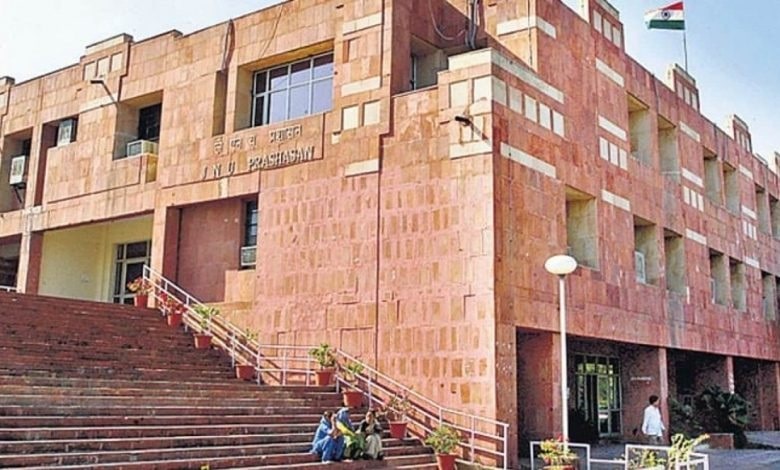Jawaharlal Nehru University (JNU) is India’s leading university and a world-renowned centre of teaching and research. Ranked first in India by the National Assessment and Accreditation Council (NAAC) with a grade point average of 3.91 (on a scale of 4), JNU was ranked #3 among all universities in India by the Government of India’s National Institutional Ranking Framework in 2016 and #2 from 2017 to 2025. JNU also received the Best University Award from the President of India in 2017.
Established by an Act of Parliament in 1966, still a young university. Jawaharlal Nehru University’s strength, energy, and reputation are the result of the vision that ideas are a field of adventure, experimentation, and constant discovery, and that diversity of thought is the foundation of intellectual exploration.
JNU is a place for the intellectually restless, the insatiably curious, and the mentally tenacious, offering them a place to grow amidst the tranquillity of a green lung, an oasis amidst the hustle and bustle of India’s capital.
Overview and History of Jawaharlal Nehru University
JNU was established in 1969 in New Delhi, India, and is a central public university with a focus on postgraduate and research programs. It is known for its academic and research zeal and has been recognised for decades for its expertise in the humanities, social sciences, languages, and science and technology.

The university campus is located on New Mehrauli Road in southwest Delhi.
JNU Courses and Academic Programmes
JNU offers a wide range of programmes, including undergraduate (UG), postgraduate (PG), doctoral (PhD), and various certificate and diploma courses.
Academic Programmes Key highlights: Over 100 courses across streams: Arts, Social Sciences, Languages, Science, Engineering, Law, etc.
For example: B.A. (Hons) in multiple languages (Arabic, Chinese, French, German, Japanese, Spanish, etc) offered by the School of Language, Literature & Culture Studies.
For PG: M.A., M.Sc., M.Tech., MBA, MCA and so on. Entrance to many programmes is via national-level exams, such as CUET (UG) or CUET (PG), or CAT. After fulfilling the minimum grade requirements at the M.Phil. level, the student is enrolled on the PhD programme, which is for four years.

JNU Rankings & Reputation:
Jawaharlal Nehru University collaborates with universities around the world on research projects, conferences, and publications. It has several active MoUs with international and national universities and regularly exchanges faculty and students with them. JNU also hosts the Indian section of some international degree programs. Reputation matters, especially in competitive admissions. Here’s what JNU’s standing looks like.
+ National reputation: According to the university website, “Ranked number one in India by the National Assessment and Accreditation Council (NAAC) with a Grade Point of 3.91 (on scale of 4)”.
Under the National Institutional Ranking Framework (NIRF) 2024, JNU ranked 2nd among all Indian universities.
+ International rankings: According to QS World University Rankings 2026: JNU #=558 globally.
Subject-wise: in one news piece JNU’s “Development Studies” subject was among the world’s top 50 in QS subject rankings (though rank dropped from ~20 to ~29).
According to EduRank: JNU in 2025 globally ranked 1019th, and strong in liberal arts/social sciences nationally (#9 in India for liberal arts & social sciences) per their metrics.
Jawaharlal Nehru University Final Verdict
In a nutshell, JNU is “valued academic excellence.” For serious students interested in a rich intellectual environment, languages, social sciences, and research, this university is an attractive choice. The extremely low fees for many programs make it even more attractive.
On the other hand, if your priority is broad industry placement in a professional/technical field, or you prefer a more corporate/placement-driven campus environment, you should compare JNU with other institutions to ensure it aligns with your goals.
In short: With the right mission and vision, JNU offers one of the best value propositions in Indian higher education today.
Also Read: Why do Indian Institutes of Management (IIMs) Dominate Among MBA Aspirants in India?





